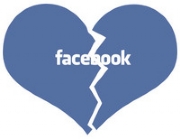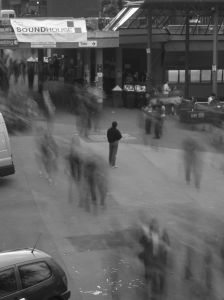 I love technology. I love living in the 21st century with all its gadgets, and I’m continually amazed at what we are able to do now that we couldn’t do even 5 years ago. Who knows what we’ll be able to do in 5 years from now? When a new piece of technology comes out, there is that special surge of excitement you get with the anticipation of buying something new. A new technology purchase makes you feel good; you feel excited, and you want to spend all your time with your new friend. Sounds a lot like being in love doesn’t it? Take the recent launch of the iPad in Australia for example. Apparently we’re the first country outside of the US to sell the new tablet which does everything the iPhone does except make phone calls. People lined up for hours outside Apple stores all over Australia (some even slept outside stores overnight) to get their hands on this fabulous new device that promises to change the way we do computing. In a few years time though – give or take – the iPad will be old hat. After a while we tend to take for granted the technology we have at our disposal today. We often can’t imagine how we coped before mobile phones and the internet.
I love technology. I love living in the 21st century with all its gadgets, and I’m continually amazed at what we are able to do now that we couldn’t do even 5 years ago. Who knows what we’ll be able to do in 5 years from now? When a new piece of technology comes out, there is that special surge of excitement you get with the anticipation of buying something new. A new technology purchase makes you feel good; you feel excited, and you want to spend all your time with your new friend. Sounds a lot like being in love doesn’t it? Take the recent launch of the iPad in Australia for example. Apparently we’re the first country outside of the US to sell the new tablet which does everything the iPhone does except make phone calls. People lined up for hours outside Apple stores all over Australia (some even slept outside stores overnight) to get their hands on this fabulous new device that promises to change the way we do computing. In a few years time though – give or take – the iPad will be old hat. After a while we tend to take for granted the technology we have at our disposal today. We often can’t imagine how we coped before mobile phones and the internet.
Last year we commemorated the 40th anniversary of the first moon landing. At the time it was celebrated the world over as Neil Armstrong took his ‘one giant leap for mankind’. Though I was only 6 weeks old at the time, I am told that it brought the world together like few events can. But did you know that, if you have a mobile phone, that phone has more computer power than the rocket that took Neil Armstrong and his fellow astronauts to the moon? That’s just in 40 years, just one generation.
Technology has the power for so much good today. We have seen this through such campaigns as GetUp!, where thousands of people can be harnessed in a few days to lobby the Government on all sorts of issues. We can make free video calls with our friends and family overseas via Skype; we can make a host of new friends on Facebook. But technology also has the power for so much evil. Patrick Carnes, who specialises in addiction issues, says that since the advent of the internet, more than 10% of internet users regularly use the web to look at pornography, such is the ease with which it can be downloaded right into your own home.
This is where the problem with our technology lies. My pastor said some years ago that technology has become our new foundation for living. For centuries it has been money, but now it is money and technology. I remember when the talk of human cloning first began some years ago, there was an interview with a scientist about it who, when asked at a press conference about the ethics of it, simply said “we are going to do it”, as if it was preposterous to even contemplate not doing it when we have the means right in front of us, as if it was a waste of our newfound knowledge to not go ahead with it, and as if anyone opposing it was getting in the way of progress. It was the arrogance of the human spirit saying we are going to do it because we can.
As well as basing our living choices around technology, we are constantly living with the tension of trying to recreate the experience we feel when we first buy our new toy. That feeling of being in love, of being swept off our feet by the iPad of our dreams is something we desperately want to hang on to. In a healthy situation, the feeling of being in love is wonderful, and it is right to enjoy it to the full. But our problem with our purchases is that we try to hang onto that experience and make it last as long as possible until it finally disappears like sand through our fingers and we go out and look for our next purchase. And therein lies the power of the seduction of our culture. Every day, according to the Union of Concerned Scientists in the United States, we are told to buy that experience up to 3,000 times. And again and again we do, just like the adolescent who doesn’t understand the virtue of restraint. The American Franciscan priest, Richard Rohr, has said that Australian culture is just like such an adolescent. He describes the first half of life as infantile, where there is the question of boundaries, identity, security and significance. It is always win/lose, about the container. He then describes the second half of life as being about the contents – it needs to be offered to people. People in the second stage of life need to see that that’s what they want to be. Going further, he describes 4 stages to growth:
- Student
- Family, houses and children
- Forest-dweller, going beyond the comfort zone
- Wisdom
Rohr says that Australia is in the first half of life ie. it is infantile, where life has a lot to do with security and significance; and we are also generally not past stage 2 in the stages of growth. We are obsessed with comfort, as is seen in the rapidly diminishing Australian dream of owning your own home.
Many years ago Midnight Oil sang “who can stand in the way when there’s a dollar to be made”. That song is just as relevant today as it was back in the ‘greed is good’ days of the 1980s. Nothing has changed since then, and in fact nothing has changed since the dawn of humanity. The prophet Jeremiah said that the human heart is deceitful above all things.
How insane are we to actually believe that technology can be our saviour? Like many advances in human progress over the years, and particularly since the Industrial Revolution, much good has come about by our technological progress, but so has much evil as well. But don’t get me wrong; technology itself is not the issue. What we need is not less technology per se; what we need is a transformation of the human heart, something that technology can never deliver.
With each new advance in technology, there is the promise of making our lives immeasurably easier. And in so many ways it does. But is that always a good thing, and are we really any better off? Much has been written about the fact that in our technologically advanced society, the rate of depression and stress has gone through the roof.
The recent U2 song ’Breathe’ has a line which says “there’s nothing you have that I need”. That is the attitude we must have with the technological enhancements of our age. While there is a level at which much technology certainly is needed, it is not our salvation. Never has been and never will be. A sign of an addicted culture is when we allow legitimate activities to become our master when they were always designed to be our servant. Technology has done so much good for the world, and will continue to do so. But there is only one Master who follows through on the promise of life. We cannot serve both God and technology.
 Electronic devices, shops, lights, noise.
Electronic devices, shops, lights, noise.











